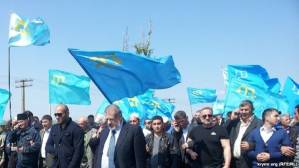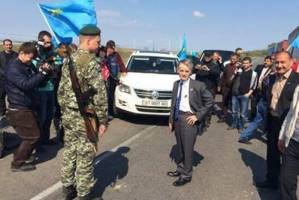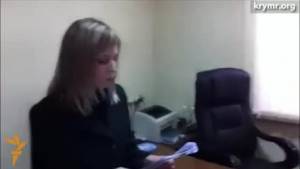’Prosecutor’ threatens to dissolve Crimean Tatar Mejlis

On May 3 around 50 Russian OMON riot police were deployed to prevent renowned Crimean Tatar leader, Mustafa Dzhemiliev from entering the Crimea. Later that day the so-called Crimean prosecutor announced that she was seeking to have criminal proceedings initiated against Crimean Tatars involved in the ensuing peaceful protest. She called the protest “public actions of an extremist nature” and threatened to dissolve the Crimean Tatars’ representative body, the Mejlis. Peaceful protesters have also received court summonses on administrative charges.
It remains unclear whether Russia and its puppet government in the Crimea are deliberately provoking conflict with the Crimean Tatars, or whether the authorities under former KGB boss Vladimir Putin simply cannot function in any other way. What is unquestionable, however, is that silence from the EU, USA, OSCE and other international players is unacceptable.
As reported, Dzhemiliev first learned of the five-year ban on April 22. The very next day the Kremlin’s propaganda channel Russia Today quoted both Crimean and Russian officials as denying any such ban. The lie became clear on May 2 when Dzhemiliev was prevented from flying to the Crimea from Moscow and forced to return to Kyiv.
The ban is an appalling affront to Dzhemiliev and the Crimean Tatars. By Friday evening the Mejlis had decided to cancel all events marking a Crimean Tatar festival on Saturday. It invited Crimean Tatars to come and greet Mustafa Dzhemiliev at Armyansk, on the border between the Crimea and the Kherson oblast.

Around five thousand people arrived in approximately one thousand cars. They formed a live corridor for the 70-year-old veteran Crimean Tatar rights defender who is also a long-standing Ukrainian MP. The acting Crimean interior minister Sergei Abizov also turned up and stated that Dzhemiliev would not be allowed in. This was then demonstrated through the deployment of OMON and Crimean “self-defence” vigilantes.
Every reason and none
Mustafa Dzhemiliev is a former Soviet political prisoner. His commitment to non-violent defence of the right of the Crimean Tatars to return to their homeland and to human rights in general allied him with Andrei Sakharov, Petro Grigorenko and others. It made him an enemy of the Soviet regime, and it is galling that 35 years on, and just months after Russia annexed the Crimea, the Russian Federation should be treating him in similar vein.
Despite assurances that the rights of the Crimean Tatars would be protected and attempts to woo them with various promises, the authorities installed under Russian occupation are now resorting to direct repression.
Natalya Poklonskaya, the prosecutor installed following Russian intervention, has issued a formal warning to the head of the Mejlis, Refat Chubarov about supposed “extremist activities”. She refused to read the warning in the Crimean Tatar or Ukrainian language and did not provide a copy of it, even though it can supposedly be appealed through the courts. A recording can be heard here.

Poklonskaya states that “if the Mejlis does not stop its extremist activities. … it will be dissolved and prohibited on the territory of the Russian Federation.” On May 3 she announced that she was sending the Russian Investigative Committee and FSB [Security Service] documents initiating criminal proceedings over what she termed “unlawful public protests of an extremist nature”.
These actions, as well as several summonses on administrative charges relate to the peaceful protests on the road from Armyansk to Simferopol and in various cities. The roads were briefly blocked in protest at the ban on Mustafa Jemiliev, however the decision was then taken that Jemiliev would return to Kyiv mainly in order to avoid any risk of physical confrontation.
Manufacturing extremism
Former president Viktor Yanukovych had many attempts made to diminish the Mejlis’ influence, but even he stopped short of threatening to dissolve it. The newly ensconced authorities in the Crimea have clearly understood that in Putin’s Russia “extremism” can be understood very loosely.
It is being used, the Russian Human Rights Council warns to turn Islam “from a religion into a protest ideology”. The movement Hizb-ut-Takhrir which is banned as extremist in Russia has never been prohibited in Ukraine, yet a community linked with it is now coming under serious pressure.
Ihor Semyvolos, Director of the Ukrainian Academy of Sciences’ Institute for Middle East Studies has warned of mass conflict if Dzhemiliev is not allowed into the Crimea on May 18, the seventieth anniversary of the Deportation of the Crimean Tatar People. This can only lead to an increase in radicalism among Crimean Tatars, which will in turn annoy Russian nationalists and could cause clashes.
Since Turkey’s prime minister, Recep Tayyip Erdoğanr has promised to ask Putin to get the ban on Dzhemiliev’s entry lifted, Semyvolos suggests that Russia might agree, but see this as a defeat and expect loyalty from the Mejlis in return. They might demand that the ceremonies on May 18 went according to a Russian scenario. Semyvolos does not believe the Mejlis would agree to this. A third option would be a kind of compromise with Jemiliev being allowed in and the Crimean Tatars avoiding “radical slogans and Ukrainian flags”.
Following the aggressive moves made against the Mejlis and peaceful protesters, compromise is already difficult. It is likely that the final trigger prompting the imposition of the ban on Jemiliev was the reinstatement of the Ukrainian flag over the Mejlis following his arrival in Simferopol on April 19. The demand for any such compromise is surely unacceptable. The Crimean Tatars did not ask for their homeland to be annexed and they have every right to retain their allegiance to Ukraine.
Over recent years, international bodies, including the OSCE, have actively called for dialogue and measures aimed at resolving the problems faced by the Crimean Tatar People. If it was difficult to find any excuse for the west’s weak response to Russia’s violation of Ukraine’s sovereignty, it is simply impossible to understand silence in the face now of overtly repressive measures against the Crimean Tatars.





